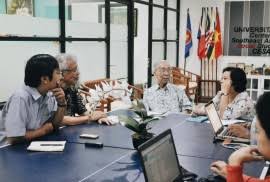Indonesia as one of the countries that is very vulnerable to natural disasters is considered to require socialization to handle them. In fact, not all sections of society in this country are able to accept the socialization held by the government. Therefore, PSSAT UGM held a discussion titled “Community Resilience on Maritime Disaster in Indonesia” with Dr. Rahman Hidayat, assistant deputy of Assistant Deputy of Infrastructures for Shipping, Fishery, and Tourism of Coordinating Ministry for Maritime Affairs, and Dr. Widjo Kongko at PSSAT UGM Library (16/03/18). The discussion in the afternoon was also attended by Prof. Dr. Judith Schlehe, Professor of Social and Cultural Anthropology at the University of Freiburg, Germany, some researchers from PSSAT, and academics.
2018
As a form of cooperation between CESASS UGM with University of Freiburg, Prof. Dr. Judith Schlehe accompanied by a researcher from CESASS UGM, Vissia Ita Yulianto, shared their knowledge in the form of workshops (08/03/18). The workshop held in the Indonesian Room of CESASS UGM Library presented the topic of waste management which is still one of the problems in Indonesia. This problem is certainly very influential with the stability, including the stability of undersea ecosystems. Therefore, this study took a case study in the southern maritime area of Yogyakarta which includes part of Gunung Kidul Regency under the title “Waste, Worldview, Morality: An Inclusive Approach”.
Social science has a central position and power to understand social problems, organize the bureaucracy, organize the economy, regulate policies and public communications in support of community life both in regional and global. The problems of social imbalances, multiculturalism, religiosity, racial intolerance, marginalities, practical politics, human trafficking , regional and global power relations, migrant workers, and social aspects of disaster need clear social-humanities academics to understand and provide referrals to policy makers (quoted from Terms of Reference).
The problem is that Indonesia as a developing country still desperately needs help from experts and scientists to do development, especially in the field of physical infrastructure, the ones that are seen to be more able to give practical contribution to society. Without realizing it, the government requires development in physical form and ignores the social infrastructure. Thus, the more days pass, social science seemed increasingly disregarded. It indicates that the government has not looked further into contribution of social-humanities sciences based research.
Center for Southeast Asian Social Studies (CESASS) UGM, supported by Ministry of Research, Technology, and Higher Education, as the Center of Science and Technology in the social field must surely question the waiver of this social sciences. Thus, CESASS invited social scientists to discuss their own discipline and even cross the boundaries of their discipline to attend Series Discussion II titled “Social Sciences: Its Roles and Challenges” (13/02/2018). Prof. Sjafri Sairin & Prof. Djoko Suryo, the head of CESASS, Dr. Phil Hermin Indah Wahyuni, along with other researchers from CESASS namely Muhadi Sugiono, M.A., Dr. Phil. Vissia Ita Yulianto, Putu Yogi Paramitha, M.H., Fatkurrohman, M.Si, and two students of the doctoral program of Department of Public Policy and Management UGM discussed the social science roles and challenges in this era.
The word ‘transgender’ may be familiar to our ears. This word meant in this article means people who have gender identity or gender expression that is different from the gender they had at birth, from woman to man, or vice versa.
Southeast Asia is one area where religion is the most considered factor, so transgender is often considered to be against the norm. Not infrequently in Southeast Asia, transgender gets discriminated, especially to enjoy a decent life. In fact, they are often forcibly evicted, fired, and so on. In fact, transgender is a human being and a citizen who has human rights. In addition, it must always be remembered that the state is obliged to provide protection to its citizens, without exception. Thus, we need to highlight this transgender phenomenon.
Centre for Southeast Asian Social Studies (CESASS) UGM got a visit from New Zealand again. This time, the two guests were Khairiah A. Rahman, M.A. from the School of Communications Studies, Auckland University of Technology and Dr. Adam Brown from Auckland Institute of Studies. Their visit to CESASS UGM Office was to share knowledge related to international journal writing. The event was packed in a workshop titled “Communicating and Publishing in International Academic Forum”.
The barrier of language differences is one of the issues that Indonesian academics often encounter when they will write English-language articles in accordance with international rules. Looking at the phenomenon, CESASS UGM tried to bridge the difficulties by holding a brief workshop on writing and publishing international scientific articles. The workshop which took place on Thursday, December 28, 2017 was held at Ruang Indonesia, CESASS UGM Library.





